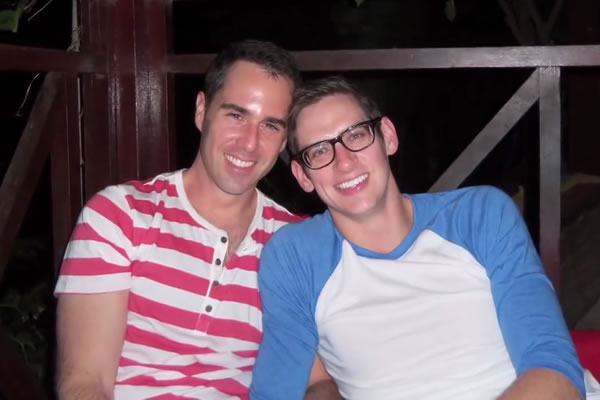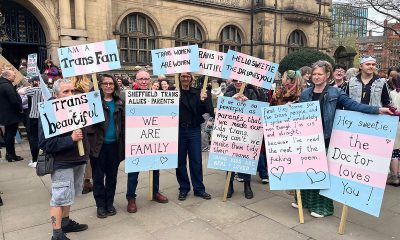News
Gay ambassador reflects on U.S. efforts in Ukraine
Baer talks monitoring mission, being openly gay in negotiations with Russia
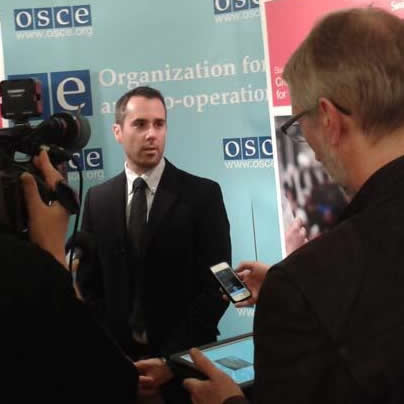
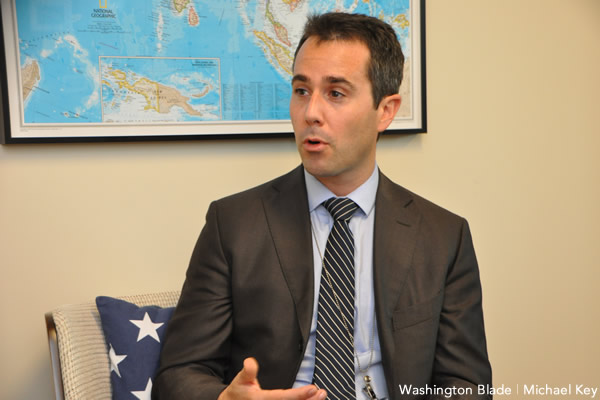
Gay U.S. ambassador Daniel Baer is representing U.S. interests during the Ukraine crisis at the Organization for Security & Cooperation in Europe (Washington Blade photo by Michael Key).
Amid the ongoing crisis in Ukraine following Russian President Vladimir Putin’s military incursion into the country, the Obama administration is relying on a gay ambassador to help de-escalate tensions.
Daniel Baer, U.S. ambassador to the Organization for Security & Cooperation in Europe, has in the days since the start of the crisis been working with envoys at the Vienna-based pan-Atlantic international forum to address the situation — in addition to keeping the world updated via his Twitter account.
His priority for the moment is achieving a consensus to allow a OSCE-based monitoring mission to enter Ukraine, although he admits he’s under “no illusion” that will be easy in a body on which Moscow has veto power.
In an interview with the Washington Blade via phone from Vienna after the third emergency meeting at the forum in as many days, Baer described the multi-level approach the United States is undertaking to de-escalate tensions in Ukraine.
“In the past, we’ve seen in other situations where there have been similar concerns raised, a monitoring mission [has worked] by both assessing and reporting facts on the ground and by being there to work to mediate tension and addressing the concerns that have been raised,” Baer said.
But Baer’s participation has significance because he’s openly gay and handling negotiations with a country that is known for enacting anti-LGBT laws and having an anti-LGBT climate.
Nonetheless, Baer, 37, said he’s never felt that his sexual orientation has been an issue for Putin’s representatives at OSCE.
“Just like being gay, working with the U.S. ambassador is not a choice, and I’m ready to work with all of them,” Baer said.
Founded during the Cold War, the OSCE was set up as a forum for the United States and the Soviet Union to speak about concerns and has become a pan-Atlantic forum now comprising 57 European, Asian and North American countries.
After the U.S. Senate confirmed Baer in August as U.S. envoy to OSCE, he relocated to Vienna with his partner of three-and-a-half years Brian Walsh, 27, a physicist now working at an international think-tank on environmental issues.
The transcript of the interview between the Washington Blade and Baer follows:
Washington Blade: How would you characterize the situation in Vienna as the crisis in Ukraine unfolds?
Daniel Baer: I guess a couple things. The OSCE is a big political organization, and an operational entity that has field offices in 16 countries, including Ukraine and many independent institutions that are doing things all the time. So, there’s been kind of two levels of activity.
One, there’s been a sense of urgency in terms of getting the existing capacities of OSCE mobilized to engage in Ukraine, and particularly in Crimea now, in the ways that they can to help de-escalate tension. So, there’s a High Commissioner for National Minorities, the Swiss special envoy who’s the current ambassador to Germany now, but a designated special envoy to Ukraine who sits as the chair of the OSCE right now. The Representative on Freedom of the Media, they just arrived in Crimea a couple hours ago, and then the project office in Kiev is being supplemented.
In addition, because OSCE does arms control, and military transparency, the Ukrainians have invited military monitoring missions. They have an invitation for two military monitors from every participating state in the OSCE.
Then, there’s the political side, and lot of people focus on the downside of the OSCE, which is you operate on consensus. And it’s a big tent that includes the Russian Federation, the United States, Canada and basically everybody in between — and Mongolia. That is both a hindrance, in the sense that it makes consensus harder, but it’s also an asset in the sense that the other project that we’re starting to work on now is trying to develop a mandate for a new special monitoring mission to Ukraine and that will require consensus, but the upside is that if we can find a description of a mandate that works for everyone, it will also have the political value of being blessed by Ukrainians, the Federation, the EU countries, Turkey, ourselves and Canada.
So, it’ll have broad backing. And so, we’re kind of taking the two-pronged approach of mobilize quickly everything that’s already set up and teed up, and ready to go, and also look at this kind of near-to-medium term possibility of setting up a monitoring mission.
That’s something that I’m under no illusions — I think it’s going to be very hard, and really all we can do is tee it up, and leave that door open. And if and when the Russian Federation decides to engage on that and walk through that door, we’ll be ready to work with them.
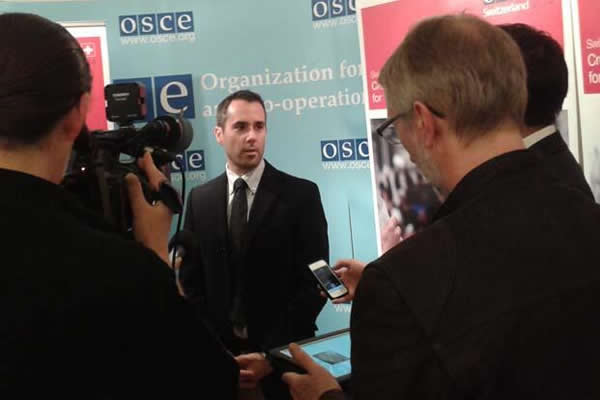
U.S ambassador to the Organization for Security and Cooperation in Europe (OSCE) Daniel Baer addresses the media following a meeting. (Photo public domain)
Blade: What makes setting up that monitoring mission “very hard”? I know Moscow has veto power on the OSCE, so how likely is it that we’ll actually see that happening?
Baer: I think the answer is it won’t happen unless Moscow decides that they see value in it, or they think it can be useful. I think our position all along has been there are a variety of concerns that have been raised by the Russian Federation, including concerns about the security of their military base and the human rights of the Russian minority in Crimea, and Ukraine more broadly, etc. There are obviously concerns that are being raised by the Ukrainians themselves about a Russian military incursion on their territory.
But the way to address the concerns that the Russians have raised is not through sending in troops, but through a monitoring mission. And this is an alternative for them. In the past, we’ve seen in other situations where there have been similar concerns raised, a monitoring mission [has worked] by both assessing and reporting facts on the ground and by being there to work to mediate tension and addressing the concerns that have been raised. Yes, they have to choose to take that route instead of the illegal and illegitimate route that they are currently taking, but… one of the ways in which we can make de-escalation more likely is by teeing up that choice, so they can make that choice. …
Blade: Let’s get a little personal. What do you think is the significance of an openly gay person representing U.S. interests in diplomacy with Russia, a country that has passed laws against gay people?
Baer: You know, I think to all of my colleagues when I showed up here in Vienna, most of my colleagues only knew one or two things about me. Everyone knew that I was gay, and the other thing talked about was that I was young. Other than that, they knew that I was an American ambassador. Six months later, it’s certainly more important that I’m the U.S. ambassador than anything else about me, and I have a decent working relationship with all my colleagues.
I have a weekly meeting with the Russian ambassador, and Brian and I have invited him and his wife to the Marine ball along with others. So, we built a working relationship. I guess it would be an interesting question for him. For me, I’m trying to do my job the best I can and represent my country the best I can.
I think one of the strengths that America has is that we increasingly — there’s still work to do on many dimensions — but we increasingly have a diplomatic corps that represents our diversity, and part of that is important because it makes us more effective. Part of that is important because it more accurately represents the country. And it’s super important because part of what others see as valuable and powerful and engaging and attractive about America is the promise of progress toward a society that embraces rights for everyone. I don’t see that as having anything to do with me, per se, but to the extent that there’s a broader story there. I think it’s valuable that we continue to make progress on that front.
Blade: So no Russian officials refused or expressed any reluctance to negotiate with you because of your sexual orientation?
Baer: I have not had any experience where they have refused to engage with me. For some people, whether Russian or otherwise, I’m the first ambassador from the United States that they’ve known was gay and they have to work with. I guess one of the advantages of being the U.S. ambassador in a multi-lateral institution is that it’s pretty hard to be effective and not work with the U.S. ambassador — one way or the other. Just like being gay, working with the U.S. ambassador is not a choice, and I’m ready to work with all of them. And I certainly go into it giving everybody the benefit of the doubt that it isn’t an issue because it shouldn’t be an issue.
Blade: You said they haven’t refused, but have they expressed any reluctance to work with you because of your sexual orientation?
Baer: Not to me. Not to me. If they have, they’ve kept it from me.
Blade: Let’s get back to the bigger picture. Regarding Secretary of State John Kerry’s visit to Ukraine, what impact do you think it’ll have on the situation?
Baer: I think the secretary has actually come and has already arrived in Paris, and will meet with [Russian] Foreign Minister [Sergey] Lavrov in Paris tomorrow. But he spent today in Kiev. I think everybody recognizes that the people of Ukraine have a new temporary government. An election’s declared for May 25. It’s usually important that there is strong support for free and fair elections, and a free and fair campaign environment. Everybody is rightfully focused on the security crisis in Crimea, and also in the rest of the country, there’s a lot of work to do.
And I think the people of Ukraine need to be supported in their efforts to build a prosperous, free, democratic Ukraine. And that’s going to take a lot of support from the international community, and I think Secretary Kerry is going to demonstrate our support for the transition government that is there until the election and our willingness and readiness to help support them in their efforts to build a free, democratic Ukraine.
Blade: How is Kerry being there having an impact as opposed to monitoring the situation from overseas?
Baer: Well, I think, certainly there’s a diplomatic value to it in terms of the conversations that you have, and, of course, it also sends a signal. So if being there sends a signal that the depth of the U.S. commitment and our engagement with the government, I think that signal is an important one to send, particularly at a moment like this.
Blade: What about sanctions? A number of European countries seem reluctant to impose sanctions on Russia. What actually can this administration do to convince its NATO allies and trading partners to get on the program for sanctions with real teeth against Russia?
Baer: Oh, I think the president and Secretary Kerry have had a number of conversations over the last 72 hours and 96 hours with allies and partners in Europe, and I think although the EU has its own function, and we have ours, etc., I think there’s a lot of strong cooperation right now on ways to respond to Russia’s illegal actions…I think there is strong cooperation between the U.S. and the E.U. and individual member states in the E.U. making clear that the Russian incursion and military presence is unacceptable and that they need to go back to their bases, and that it’s up to President Putin to do the right thing and de-escalate the situation.
Blade: Do you see that co-operation extending to an agreement on sanctions with Europe with regard to Russia?
Baer: Like I said, the secretary and president are working very hard to keep our allies and partners appraised of our steps, and to coordinate those. I think those conversations are ongoing, and I think that that strong cooperation will continue.
Blade: What do you think Putin is trying to accomplishment with this incursion? Restoration of the Soviet Union?
Baer: I don’t know. That’s a question for President Putin. I don’t know what he’s trying to accomplish, but certainly the steps that he’s taking are not contributing to stability in the region, to the future of a strong Ukraine, which Russia has everything to gain from as a close neighbor. Russia and Ukraine are going to have a relationship determined by geography if not by partnership, and so Russia has everything to gain from a strong Ukraine. There’s not an either-or choice, and the actions that Mr. Putin have taken are a violation of international law, they’re a violation of many commitments the Russian Federation has made, including here at the OSCE with respect to the sovereignty and territorial integrity of participating states. And they’re a violation of reason, and they are not in Russia’s interest, and certainly not in Ukraine’s.
Blade: What’s your reaction to today’s news that Putin said he sees no reason for Russian forces to intervene in eastern Ukraine at the moment but that Russia “reserves the right to use all means at our disposal to protect” Russian speakers if they are in danger?
Baer: I think I reject the rationale that has been offered for the military incursion and invasion so far, and there’s no defensible rationale for further movement. The right direction for the troops to move is not further, but back to their bases.
Blade: Do you think that comment is troubling?
Baer: Like I said, I think there’s no good rationale for the Russian Federation to have its troops on Ukrainian soil.
Blade: Do you see any scenario in which this crisis will escalate into military engagement involving the United States?
Baer: Nobody wants an escalation into war, so all of our efforts are focused on de-escalating the situation through direct diplomatic engagement and the deployment of an international monitoring force either through the OSCE or the UN. They’re other ways to approach this, but we’re certainly working around the clock to the head in that direction.
Blade: Is it safe to say military engagement is off the table?
Baer: That’s not a question for me.
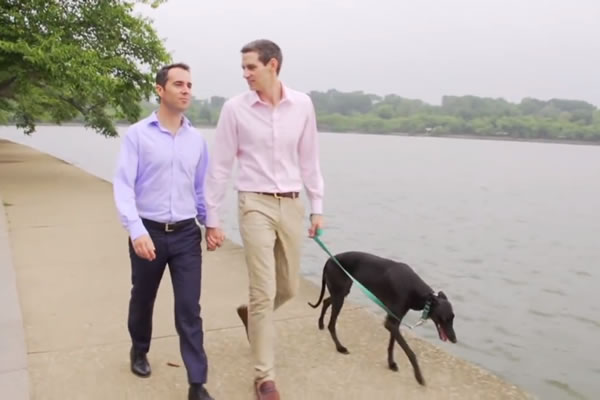
U.S. ambassador for the Organization for Security and Co-operation in Europe (OSCE) Daniel Baer with partner Brian Walsh. (Image public domain)
Blade: Let’s get back to some personal stuff. How is the situation with Brian since you’ve moved to Vienna and since the start of his crisis?
Baer: I get to spend far less time with Brian, but other than that it hasn’t changed anything. We’re settling well, and he’s incredibly supportive.
Blade: Do you have any anecdotes about any activities you too had engaged in since you’ve moved to Vienna?
Baer: Well, it’s been a big change because it’s a new country and a new job. And we’ve been skiing in Austria, and that was fun. Being a diplomat overseas is very different from working in the State Department. One of the advantages being here in this post is you have 56 other ambassadorial colleagues and there’s an interesting and diverse group of people to get to know.
We’re settling into that world, and the whole time, we’re very, very much aware of the fact that this is a temporary arrangement. We’re trying to make the most of it. Enjoy the hard work, enjoy the fun and cool parts of the job.
Blade: Let’s get back to Russia. How do you evaluate how Russia handled the Olympics?
Baer: I think we’re all glad that the Olympics came off without any security incidents, etc. I think, as everyone knows, there was a great deal of investment of resources and political attention in the Olympics, and I was proud of U.S. athletes.
Blade: There were reports that were some arrests of demonstrators, including those protesting about LGBT rights. Were you aware of that and do you think they were cause for concern?
Baer: Yes. It’s always of concern when there are arrests of people protesting. In the Russian Federation, unfortunately, it’s not extraordinary. And there were arrests this past weekend of protesters who were protesting Russia’s invasion. Several hundred people were detained, I believe. I should check the reports. And there was a sentence last week of protesters, people who protested in the Bolotnaya Square, protests in 2012. So, Russia’s recent record on freedom of expression and freedom of association and assembly is not encouraging.
Blade: Russia has passed anti-gay laws that were criticized by the international community. Now that the Olympics are over, what is going to happen to LGBT people in Russia?
Baer: I think there are two things. One, we will continue to call out the so-called gay propaganda law and the other laws that have either been proposed or enacted along with it. Obviously, they’re inconsistent with internationally recognized human rights, and that such laws not only affect gay people, but the broader population, and also have a teaching effect, which creates a climate in which the rights of LGBT rights are most likely to be disrespected. We’ve seen an uptick in the kind of vigilante beatings of LGBT people posted online. The climate of intolerance that such laws encourage is something to be deeply concerned about.
That said, I think one of the things that it’s really important to focus on is that it’s not only gay people who have their rights trampled in the Russian Federation. Minorities, migrants from neighboring countries that represent minority populations suffer enormous discrimination, and obviously any Russian citizen has a hard time expressing political views that are critical of the government or joining a peaceful protest. The anti-gay laws are actually happening against a much broader recession on human rights more generally.
Blade: And what do you think is the best way forward to address that by the international community?
Baer: I think first of all, I always start from the premise that lasting change comes from within, so to continue to shine a light on human defenders and advocates who are making the case for change where they are — both LGBT, and more broadly, the human rights defenders and activists — and to call out the cases when their rights are violated. I think making the case to the Russian population more broadly as well to Russian leadership that a strong stable Russian Federation does not come from doubling down on restrictions it comes from democratic progress, including people who have respect for human rights. You have to make the political argument, and you have to call out the failures, and to continue to press, and know that doors will open where you don’t expect them, and you need to be ready to walk through them.
By calling out people’s situations, you remind them that they’re not alone and that they have people who are with them, and, over the long run, you push and you push and you push.
There’s a strong civil society that understands all of the reasons why the backsliding on human rights more broadly is bad for business, and all around it’s bad for Russia, and that trajectory needs to be turned around.
Blade: What about upcoming plans for you and Brian?
Baer: We’re getting married this summer. We haven’t quite figured that out yet because same-sex marriage isn’t legal in Austria, but we’re working on that. But in August.
Kenya
Kenya Red Cross-owned hotel to host anti-LGBTQ conference
Speakers from US, European countries to participate in May 12-17 gathering

Plans to host a family values meeting next month in a 5-star hotel in Nairobi that the Kenya Red Cross Society co-owns have sparked an uproar among local queer rights groups.
The groups accuse the Kenya Red Cross of violating its Global Fund commitment of protecting key populations by allowing its Boma Hotel to host an “anti-gender and anti-LGBTQ” conference.
Influential guest speakers from the U.S., the Netherlands, Spain, and Poland will preside over the Pan American Conference on Family Values that will take place from May 12-17. The Kenyan advocacy groups say these speakers’ organizations are globally recognized for undermining LGBTQ rights.
“As the principal recipient of Global Fund in Kenya, hosting this event contradicts (the) Red Cross’s humanitarian mission and threatens the safety and dignity of people living with HIV, women and LGBTQ+ individuals, the communities that Kenya Red Cross Society has long committed to supporting,” the queer rights groups state.
The LGBTQ groups that have criticized the Kenya Red Cross include Upinde Advocates for Inclusion, the Initiative for Equality and Non-Discrimination, and Gay and Lesbian Coalition of Kenya. They have also launched an online signature collection drive to compel the Kenya Red Cross to withdraw the hotel from hosting the “Promoting and Protecting Family Values in Challenging Times”-themed conference.
“The event’s so-called ‘family values’ narrative is a smokescreen for policies that push hateful legislation and promote death, discrimination, femicide, gender-based violence, and restrict fundamental freedoms across Africa,” the groups said.
The pro-life Western organizations that are scheduled to participate in the conference include Family Watch International from the U.S., CitizenGo from Spain, the Ordo Luris Institute from Poland, Christian Council International from the Netherlands, the New York-based Center for Family and Human Rights (C-FAM), and the Foundation for American Cultural Heritage. Their local counterparts include the National Council of Churches of Kenya, the Kenya Christian Professionals Forum, the Africa Christian Professionals Forum, and the Evangelical Alliance of Kenya.
C-FAM President Austin Ruse; Family Research Council Vice President for Policy and Government Affairs Travis Wever; Global Life Campaign Executive Director Thomas W. Jacobson; and the Rev. Ricky Chelette, executive director of Living Hope Ministries, Inc., and president of the Institute of Biblical Sexuality are among the U.S. guest speakers. Other participants include Henk Jan van Schthorst, president of Christian Council International’s board of directors, Ordo Luris Institute President Jerzy Kwasniewskie and his colleague, Rafal Dorosinski, director of the group’s Legal Analysis Center.
The Kenyan groups through their online petition — “Tell Red Cross Kenya Not to Give Hate a Platform” — has so far raised more than 1,000 of the 10,000 signatures they hope to collect. The petition is addressed to Red Cross Kenya Secretary-General Ahmed Idris and his predecessor, Abbas Gullet, who is the hotel’s director.
“We call on you to immediately cancel this booking and publicly reaffirm Red Cross’ commitment to human rights, health and inclusivity,” the petition reads. “Failure to act will raise concerns about whether (the) Red Cross can still be trusted by the community to lead with empathy and fight for their rights.”
The Kenya Red Cross, however, maintains the Boma Hotel is a separate entity, even though public records indicate it is one of the facility’s shareholders.
The LGBTQ groups note the hotel should be a safe space that promotes inclusion, not platforms that enable “harmful gathering” for hate and exclusion by “dangerous groups.”
“By providing a venue for this event, Red Cross directly enables a platform for hate and discrimination — a stark contradiction to the values of inclusivity, humanity, and nondiscrimination that the organization claims to uphold,” they said.
The organizations further warn that proceeding to host the conference threatens the relationship between the Red Cross and the marginalized communities who have long depended on the humanitarian organization for support and protection. CitizenGo has nonetheless criticized the LGBTQ groups, which it describes as “radical activist groups” for “trying to silence a pro-family event” and asked the Kenya Red Cross and the Boma Hotel not to back down.
“These groups are calling the event ‘hateful’ because it affirms the natural family — marriage between a man and a woman — and the dignity of every human life, including the unborn,” Ann Kioko, the group’s campaign director for Africa and the U.N., said.
Through an online counter signature collection drive, Kioko holds CitizenGo and other groups won’t be intimidated, silenced or apologize to the queer rights groups for defending “our families, our faith and our future”.
“The real goal of these foreign-funded activist groups is to impose LGBTQ and gender ideologies on Africa — ideologies that have led elsewhere to the confusion of children, the breakdown of family structures and the rise of sexual libertinism that results in abortion, STIs and lifelong emotional and psychological trauma,” Kioko stated.
India
Opposition from religious groups prompts Indian Pride group to cancel annual parade
Event was to have taken place in Amritsar on April 27

Pride Amritsar, a student-led organization in the Indian state of Punjab, earlier this month announced the cancellation of its Pride parade that was scheduled to take place on April 27, citing opposition from certain religious groups.
The event, planned for the Rose Garden in Amritsar, a city revered as a spiritual center of Sikhism, had faced mounting resistance from Sikh religious organizations, including the Nihang Singh faction and the Akal Takht, the faith’s highest temporal authority. These groups labeled the parade as “unnatural” and urged local authorities to deny permission, citing its potential to disrupt the city’s religious sanctity.
In an Instagram post on April 6, Pride Amritsar organizers Ridham Chadha and Ramit Seth elaborated on its mission and the reasons for the cancellation.
“Since 2019, we have organized peaceful parades and celebrations in Amritsar to connect and uplift the LGBTQIA+ community, with a particular focus on transgender individuals and their rights,” their statement read.
Chadha and Seth highlighted Pride Amritsar efforts in providing guidance, counseling, and job opportunities, which have been met with positive responses. However, due to opposition this year, Pride Amritsar announced the cancellation of the 2025 parade.
“We have no intention of harming the sentiments of any religious or political groups,” the statement read. “The safety of our members is our top priority, and we will take all necessary measures to ensure their protection.”
Chadha and Seth spoke with the Washington Blade about their decision to cancel the parade.
They explained that resistance came from both religious and political groups who labeled the parade and its values as anti-Sikh and contrary to Punjabi and Indian cultural norms. Critics specifically objected to the event’s location in Amritsar, a city regarded as a sacred center of Sikhism, arguing that the parade would disrupt its spiritual purity.
Chadha and Seth stressed Pride Amritsar lacks political, financial, or legal support. Composed of students and young professionals, the group organizes the parade biennially, dedicating personal time to advocate for the LGBTQ community.
“We do it independently, crowdfund the parade and cover the rest with our pockets,” said Seth and Chadha.
When asked by the Blade why Pride Amritsar did not approach the High Court or local authorities to protect the parade, despite the Supreme Court’s 2018 ruling that decriminalized consensual same-sex sexual relations, Chadha and Seth cited significant barriers.
“Pursuing legal action in India requires substantial resources, both financial and temporal,” they explained.
Chadha and Seth also noted that such action could lead to public shaming and unwanted publicity for participants, potentially harming their careers in Amritsar. They therefore chose not to pursue legal recourse.
Chadha and Seth said Pride Amritsar does not have any plans to hold alternative events.
“We are still exploring options, but we are likely not holding any events this year,” they said, citing significant harassment that organizers faced and the need for time to plan how to best serve the local LGBTQ community moving forward.
“Our evaluation of what the biggest challenge is has changed after this year,” said Chadha and Seth to the Washington Blade. “The biggest challenge, by far, seems to be education. We need to educate the community about what the community is, does, and why it exists. Why we do parades. Why we dance. Why calling someone ‘chakka’ is harmful. How we actually fit into religion and fall within the guidelines.”
Chadha and Seth said organizing the parade in Amritsar since 2019 has been an uplifting experience, despite continued opposition.
“The moment you join the parade, chant a slogan, or sing a song, it’s transformative,” they said. “Fear vanishes, and a sense of freedom takes over.”
The cancellation of the 2025 Amritsar Pride Parade has sparked concerns among activists in Punjab, as the Indian Express reported.
The Punjab LGBT Alliance and other groups expressed concern that the decision to cancel the parade may strengthen opposition to future LGBTQ-specific events.
District of Columbia
D.C. police seek help in identifying suspect in anti-gay threats case
Victim threatened with assault, called ‘faggot’ as he left Capitals game

D.C. police are seeking help from the public in identifying a male suspect whose image was captured by a video surveillance camera after he allegedly shouted anti-gay slurs and threatened to assault a man at 6th and H Streets, N.W. on March 20 at about 9:54 p.m.
A police report says the victim told police the incident took place shortly after he exited the nearby Capital One Arena where he had attended a Washington Capitals hockey game.
The police report says the incident began when the victim saw the suspect yell a racist slur at a person behind the victim and started to berate a valet operator.
“Suspect 1 then turned his attention to Victim 1 and called him a ‘faggot’ among other homophobic slurs,” the report says. It says the victim then used his phone to record the suspect, prompting the suspect to walk away before returning and “snatching” the phone from the victim’s hand.
“Suspect 1 walked several feet as Victim 1 followed, requesting his phone back,” the report continues. “Suspect 1 stopped and turned to Victim 1 and while yelling other obscenities exclaimed ‘if you keep recording, I’m going to kick your ass.’” The report concludes by saying the victim was able to recover his phone.
It lists the incident as a “Threats To Do Bodily Harm” offense that is a suspected hate crime.
“Anyone who can identify this suspect or has knowledge of this incident should take no action but call police at 202-727-9099, or text your tip to the Department’s TEXT TIP LINE at 50411,” according to a separate police statement released April 23.
The statement says police currently offer an award of up to $1,000 to anyone who can provide information that leads to an arrest and indictment of the person or persons responsible for a crime committed in D.C.
D.C. police spokesperson Tom Lynch said the case has been under investigation since the incident occurred on March 20. He said the video image of the suspect, most likely obtained from a security camera from a nearby business, was released to the public as soon as it was obtained and processed through the investigation.
-

 Federal Government1 day ago
Federal Government1 day agoHHS to retire 988 crisis lifeline for LGBTQ youth
-

 Opinions1 day ago
Opinions1 day agoDavid Hogg’s arrogant, self-indulgent stunt
-

 District of Columbia20 hours ago
District of Columbia20 hours agoD.C. police seek help in identifying suspect in anti-gay threats case
-

 Theater4 days ago
Theater4 days ago‘Bad Books’ a timely look at censorship in local library

